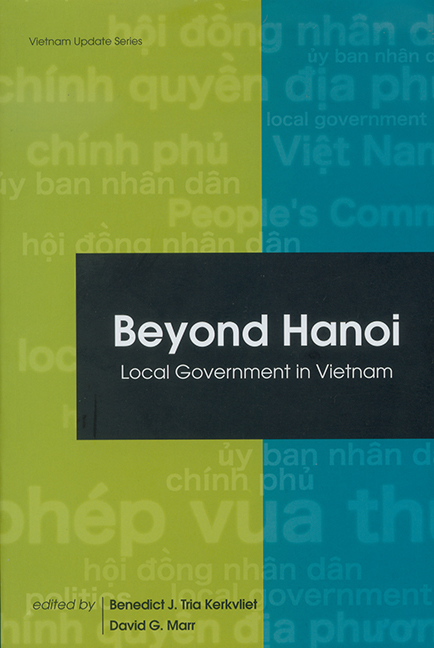Book contents
- Frontmatter
- Contents
- Preface
- Abbreviations
- 1 Surveying Local Government and Authority in Contemporary Vietnam
- 2 A Brief History of Local Government in Vietnam
- 3 Village Government in Pre-colonial and Colonial Vietnam
- 4 Caught in the Middle: Local Cadres in Hai Duong Province
- 5 Winter Crop and Spring Festival: The Contestations of Local Government in a Red River Delta Commune
- 6 Local Politics and Democracy in a Muong Ethnic Community
- 7 Local Government in the Exercise of State Power: the Politics of Land Allocation in Black Thai Villages
- 8 Urban Government: Ward-level Administration in Hanoi
- 9 The Facilitators of Rural Transformation and Development: The Role of Agricultural Extension Officers in Two Districts of Long An Province
- 10 Ho Chi Minh City's Post-1975 Political Elite: Continuity and Change in Background and Belief
- 11 Push, Pull, and Reinforcing: The Channels of FDI Influence on Provincial Governance in Vietnam
- Glossary of Vietnamese Terms
- Index
- About the Contributors
7 - Local Government in the Exercise of State Power: the Politics of Land Allocation in Black Thai Villages
Published online by Cambridge University Press: 21 October 2015
- Frontmatter
- Contents
- Preface
- Abbreviations
- 1 Surveying Local Government and Authority in Contemporary Vietnam
- 2 A Brief History of Local Government in Vietnam
- 3 Village Government in Pre-colonial and Colonial Vietnam
- 4 Caught in the Middle: Local Cadres in Hai Duong Province
- 5 Winter Crop and Spring Festival: The Contestations of Local Government in a Red River Delta Commune
- 6 Local Politics and Democracy in a Muong Ethnic Community
- 7 Local Government in the Exercise of State Power: the Politics of Land Allocation in Black Thai Villages
- 8 Urban Government: Ward-level Administration in Hanoi
- 9 The Facilitators of Rural Transformation and Development: The Role of Agricultural Extension Officers in Two Districts of Long An Province
- 10 Ho Chi Minh City's Post-1975 Political Elite: Continuity and Change in Background and Belief
- 11 Push, Pull, and Reinforcing: The Channels of FDI Influence on Provincial Governance in Vietnam
- Glossary of Vietnamese Terms
- Index
- About the Contributors
Summary
Vietnam's National Assembly passed a new land law in July 1993. The government and western observers heralded the law as cornerstone of a new rural policy. In the past, collective and state units had legal control over land, the primary productive resource in rural areas. The land law provided the basis for households to receive legal land use titles for land. Furthermore, the law mandated the state to implement the legal change through a nation-wide process of land allocation, including registration and certification of land holdings. The expectation was that land allocation would be finished within a few years — a formidable task considering Vietnam's total area of thirty-three million hectares.
So far, land allocation has produced a diversity of outcomes. It proceeded smoothly in some areas, but has not been completed in others. Where the state has implemented land allocation, it followed different practices. In some areas, local authorities reassigned land to historical owners. For example, Tay people in Bac Can province successfully reclaimed wet rice fields that they had cultivated up to the 1960s. Dao and Kinh people ended up without wet rice fields, even though they had received those in the course of state-sponsored sedentarization and resettlement programmes in the 1960s and 1970s. Local authorities in other areas distributed land to households currently living in a village. Yet they applied different formulae for dividing agricultural fields to households, including distribution on a per capita basis, distribution based on household labour capacity, allocation to economically strong households, and various types of bidding systems. These are just a few examples to illustrate a general point: land allocation has witnessed a perplexing diversity of local processes and outcomes.
Three explanations come to mind as to why the Vietnamese state has not been able to implement land allocation and enforce new land legislation in a uniform manner. First, the state may not possess sufficient means of enforcement. Financial constraints and low-skilled cadres prevent consistent implementation of national directives. Second, the implementation of land allocation may suffer from inter-ministerial differences, as it involves the cooperation of several line agencies.
- Type
- Chapter
- Information
- Beyond HanoiLocal Government in Vietnam, pp. 167 - 196Publisher: ISEAS–Yusof Ishak InstitutePrint publication year: 2004



